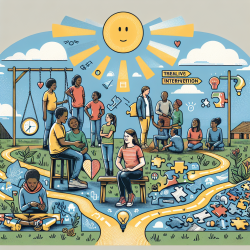Introduction
In the realm of speech language pathology and mental health interventions, data-driven approaches are crucial for developing effective strategies that yield positive outcomes. A recent study titled Mental health outcomes of a pilot 2-arm randomized controlled trial of a HIV-prevention program for South African adolescent girls and young women and their female caregivers offers insightful findings that can inform practitioners in enhancing their intervention techniques.
Understanding the Study
The study explored the impact of the IMARA-SA program, a culturally adapted family-based intervention designed to address both mental health and sexual and reproductive health (SRH) concerns among South African adolescent girls and young women (AGYW). This program involved female caregivers, acknowledging their pivotal role in influencing AGYW's mental health and SRH behaviors.
Key Findings
- AGYW who participated in the IMARA-SA program showed significant reductions in anxiety and depression symptoms compared to those in the control group.
- Although not statistically significant, there was a trend toward reduced PTSD symptoms among participants.
- The involvement of female caregivers was instrumental in fostering a supportive environment, potentially mitigating the effects of isolation and distress exacerbated by the COVID-19 pandemic.
Implications for Practitioners
For practitioners in the field of speech language pathology and mental health, the study underscores the importance of integrating family-based approaches into intervention strategies. Here are some actionable insights:
- Incorporate Family Support: Engage caregivers in the intervention process to enhance the effectiveness of mental health and SRH programs.
- Utilize Culturally Relevant Methods: Tailor interventions to align with the cultural context of the target population to improve engagement and outcomes.
- Focus on Emotional Regulation: Teach emotion regulation strategies to help AGYW manage distress, which can positively influence their SRH behaviors.
Encouraging Further Research
While the pilot study presents promising results, further research is essential to validate these findings in larger, more diverse populations. Practitioners are encouraged to explore the following areas:
- Investigate the long-term effects of family-based interventions on mental health and SRH outcomes.
- Examine the specific mechanisms through which caregiver involvement influences AGYW's mental health resilience.
- Assess the scalability and adaptability of the IMARA-SA program in different cultural settings.
By pursuing these research avenues, practitioners can contribute to the development of robust, evidence-based interventions that support the mental health and well-being of AGYW globally.
To read the original research paper, please follow this link: Mental health outcomes of a pilot 2-arm randomized controlled trial of a HIV-prevention program for South African adolescent girls and young women and their female caregivers.










